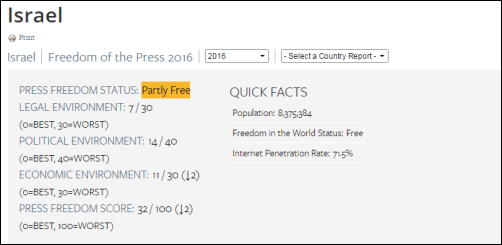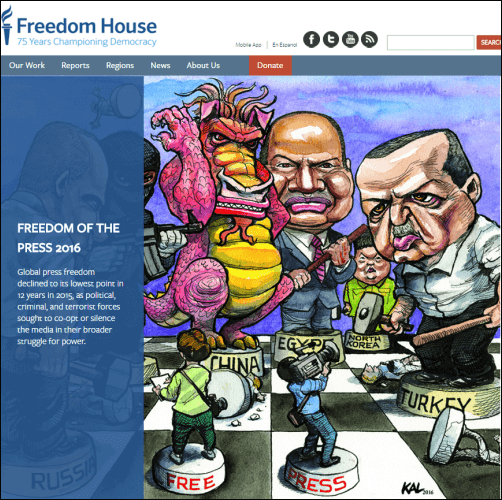What happened?
Freedom House, a US-based organization which promotes freedom and democracy around the world, published an annual ranking of press freedom in various countries. And to those familiar with Israel’s spirited culture of public debate, the organization’s downgrade of Israel from “Free” to “Partly Free” seems surreal.
Yet even more skewed than Israel’s ranking, is the reason: according to Freedom House, “Israel declined from Free to Partly Free due to the growing impact of Israel Hayom, whose owner-subsidized business model endangered the stability of other media outlets, and the unchecked expansion of paid content—some of it government funded—whose nature was not clearly identified to the public.”
This is nothing short of insane. I can’t think of any country in the world that has more self-criticism and free argument than the Israeli press.
After all, arguing is Israel’s national sport.
Join the fight for Israel’s fair coverage in the news
Is this a fair analysis of Israeli media?
Jonathan Tobin points out that owner-subsidized news outlets are practically a tradition in the United States, comparing Yisrael Hayom’s owner Sheldon Adelson to, “…press barons of an earlier era in the United States when newspapers were mission-oriented rather than profit machines to be milked. [Adelson] is determined to provide an alternative to most of the mainstream Israeli media that are as left wing as its American counterparts.” America’s ranking? Free.
The success of a newspaper that can afford to lose money does indeed limit the ability of other papers to compete in the market place. That happens to be the biggest argument against the UK’s mandatory license fee, which funds the BBC. Yet Freedom House did not downgrade the U.K.’s ranking on this basis.
In fact, in the United Kingdom, the free Evening Standard newspaper and the free Metro newspaper are among the top highest circulation newspapers in the country, while circulation has declined for pay newspapers: the Sun, the Daily Mirror and the Daily Telegraph. The U.K.’s ranking? Free.
Let’s compare Israel’s ranking to other “partly free” countries.
• Guatemala: Ranking – Partly Free. Reasons include, “assault, harassment, or detaining” and “violence [that] is attributed to criminal gangs and drug traffickers.”
• Colombia: Ranking – Partly Free. Reasons include that journalists “work under dangerous conditions” and “face harassment from… paramilitaries, local criminals, drug-trafficking groups, guerrilla movements, and the government.”
• Poland: Ranking – Free. This is a higher ranking than the one assigned to Israel, even though in Poland, “…statements that offend religious beliefs—are criminal offenses punishable by fines and imprisonment.”
To be clear: in countries other than Israel, a ranking of “Partly Free” typically results from factors such as violence, intimidation and imprisonment. Israel has none of these factors, yet has been downgraded to the same low ranking as those other countries for one reason, and one reason only: because Israel has a popular free newspaper.
There is no question that Israel is imperfect in many ways, as evidenced by the healthy argument we see constantly in Israel’s notoriously free press. Should Israel ever begin to beat, intimidate and imprison journalists as other “Partly Free” countries do, then a ranking of “Partly Free” will certainly be appropriate. Until that day comes, Freedom House should hold Israel to the same standards it applies to every other country on Earth.
Freedom House tried a similar tactic in 2013, but eventually reversed its decision and returned Israel’s ranking to “Free.”
Why does all this matter?
How the world perceives Israel’s press freedom impacts whether the world will believe anything Israel has to say.
Please send your considered comments to Freedom House at [email protected]




